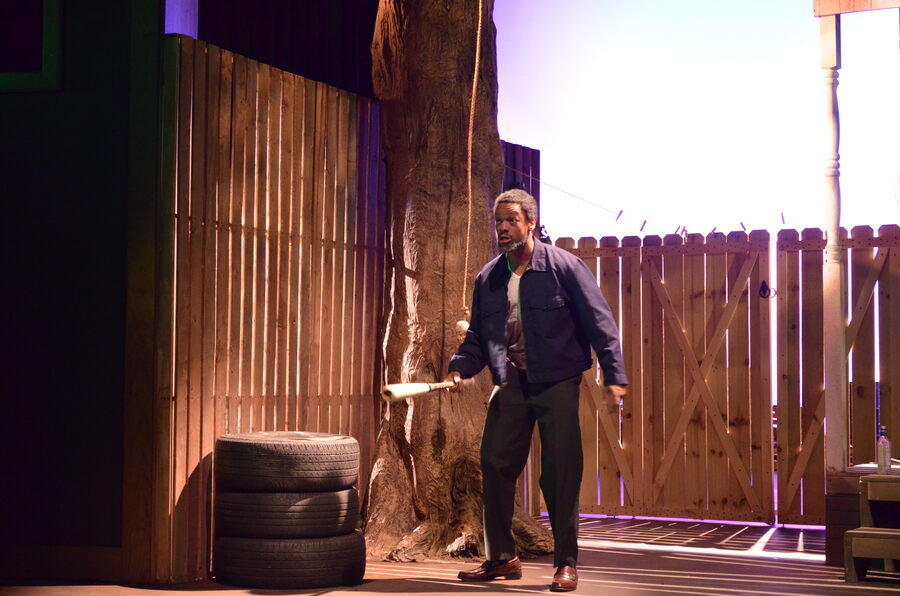When two-time Academy Award-winning costume designer Ruth E. Carter delivered the commencement address at her alma mater, Hampton University, in May 2023, she put both of her gold statues on the podium. The students immediately cheered and jumped out of their seats as she captivated the graduating class with a simple message: If I can do it, so can you.
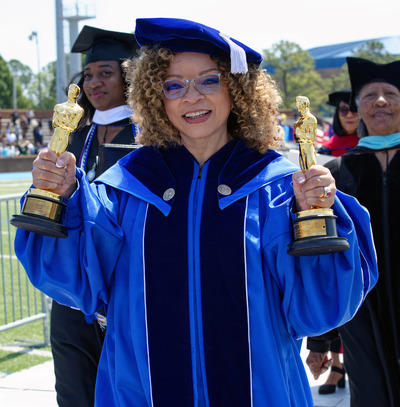
Carter, the first Black woman to earn multiple Oscars for creating the Afrofuturistic looks for both Black Panther films, also received nominations for her work on Malcolm X and Amistad. Originally studying to be an actress, she graduated in 1982 with a degree in theatre arts, splitting her undergrad years between performing and becoming the school’s lead designer after one of her professors gave her the key to the costume closet. Having unlimited access to that space is what changed her career path and laid the foundation for her to make history.
“Nobody wanted to do costumes, so I didn’t have anyone competing with me,” said Carter of her time at Hampton. “Everyone had the dream of becoming a star or actor in Hollywood. I was creating my own curriculum, so I was a little unsure if I had enough training. That mentorship put into my head that I had a future.”
Carter is among the plethora of film, television, and theatre professionals who either attended or graduated from a Historically Black College and University (HBCU) with an emphasis in theatre. At D.C.’s Howard University, the drama program turned out such talents like Oscar-nominated actress Taraji P. Henson, Tony winner Phylicia Rashad, her multi-talented, Emmy-winning sister Debbie Allen, Lynn Whitfield, orchestrator Harold Wheeler, and late actors Ossie Davis and Chadwick Boseman.
Myles Frost, who took home the Tony for Best Lead Actor in a Musical for MJ the Musical in 2022, attended Bowie State University in Maryland. Grammy-winning singer Erykah Badu studied theatre at Grambling State University in Louisiana, Oprah Winfrey majored in drama at Tennessee State, and alumni of Atlanta’s Morehouse College include Samuel L. Jackson, Brian Tyree Henry, and John David Washington, among others.
A History of Possibilities
There are currently 102 HBCUs in the U.S and 35 of those institutions offer theatre. Students and faculty at Clark Atlanta University started staging plays on campus at the turn of the 20th century, producing classics such as The Rivals and The Taming of the Shrew. Dillard University in New Orleans, which trained veteran talents Garrett Morris and Beah Richards, created the first HBCU theatre degree program in 1936. Thirteen years later, Howard University launched its drama department.
Theatre programs at HBCUs include hands-on training to prepare students to become well-rounded and competitive both on- and offstage in the real world. Most majors are required to take courses in acting, directing, voice, stage management, improvisation, theatre appreciation, and creative writing. Enrolled students often have to perform, design sets, market and publicize their productions, and write research papers. It’s a strategy professors use to empower students to take pride in themselves as people of African descent as well as in their work.
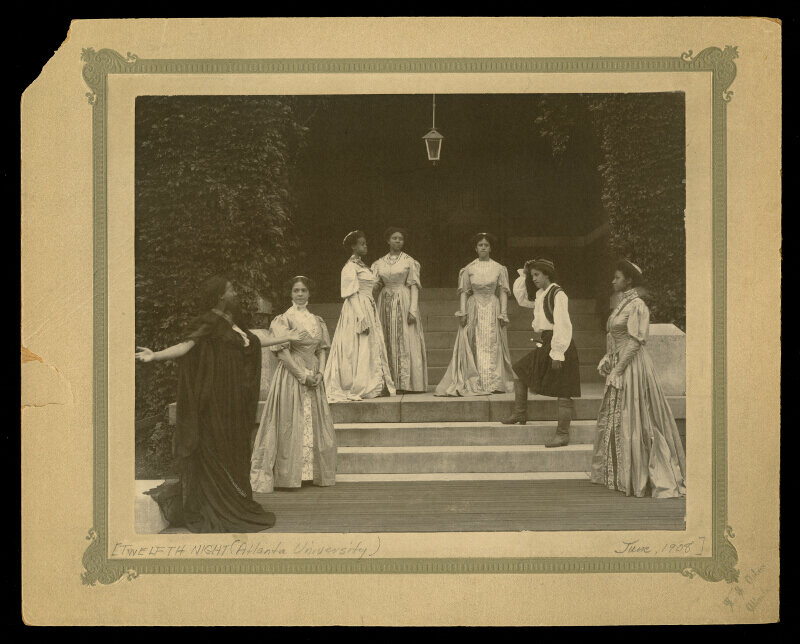
HBCUs often lack infrastructure, available faculty, and state-of-the art facilities to perform and train talent, as they are underfunded by both state and federal government, along with relatively low alumni philanthropy because of devastating student loan debt. Still, Black students work through those limitations at HBCUs to learn the art of being self-sufficient and collaborative. “That’s a training in itself that creates drive in students,” said Garry L. Yates, Clark Atlanta University’s former speech and theatre chair-turned-mass media arts associate professor. “Because we lack equipment, it just makes us work a little harder, and the things we did have, we cherished those things.”
Tony-winning director and producer Kenny Leon has directed 15 Broadway productions (and counting) after completing his studies at Clark Atlanta University. Studying political science but taking all theatre electives, the director made it a point to regularly observe people in public spaces and “on the yard,” or on campus, to help actors mold characters onstage. He acknowledges one of his professors, Joan Lewis, as someone who made him appreciate discipline as part of directing.
“I was taught to not let anybody outwork you,” said Leon, who founded True Colors Theatre Company in Atlanta in 2002. “She would demand that you stay in and not go out to the party to work on your character. I was trained to believe in myself and know that anything is possible. You didn’t have to go to Juilliard, Harvard, or Yale. All you have to do is understand the practicality of what creates a character, and now I’m on top of the world.”
That type of tough love and mentorship is a cornerstone of the HBCU experience. For many students, it’s their first time having numerous Black teachers at one school. Professors in turn care for their students like their own birth children, getting to know each student by their full name and turning semesters into lifelong relationships with their pupils.
Like Leon, Keara Jones also received her bachelor’s degree in theatre from Clark Atlanta University. The 2020 graduate took courses for her major, taught by Atlanta-based actors, while balancing a work study job as an assistant in the theatre department’s main office. She noticed the way professors would acknowledge each and every student on a first-name basis in and out of class, and credits that family-oriented atmosphere, as well as her instructors’ life lessons in class and their professional experience, for setting her up for success.
“It reassured me that I was learning the tools necessary to be a working actor,” said Jones, an alumna of the American Theatre Wing. “It opened doors for my classmates and I to audition for professional theatre in Atlanta, gain internships, and work under some big names, too.”
Being a student in one of these departments can be so inspiring, it’s not uncommon for alumni to return to their alma maters as faculty. Luther Wells, associate director of Florida A&M University’s (FAMU) Essential Theatre, graduated from the school in 1984. Among his classmates was In Living Color cast member T’Keyah Crystal Keymah, and the department’s alumni include Tony winner Anika Noni Rose and Emmy nominee Meshach Taylor. Wells remembers the theatre’s late director, Ronald O. Davis, keeping track of his theatrical work post-undergrad and offering him a job to teach at FAMU following his thesis presentation for his MFA in acting from the Ohio State University in 1993.
Davis encouraged Wells to view theatre as a space for problem solving and critical thinking. “We were a small program that didn’t have a lot of money, but if we went to Dr. Davis with ideas, he would then challenge us to bring those things into fruition,” Wells said. “I wanted to come back and help improve the program and expose students to experiences and opportunities that I didn’t have while I was an undergraduate student.”
Preparation for the Future
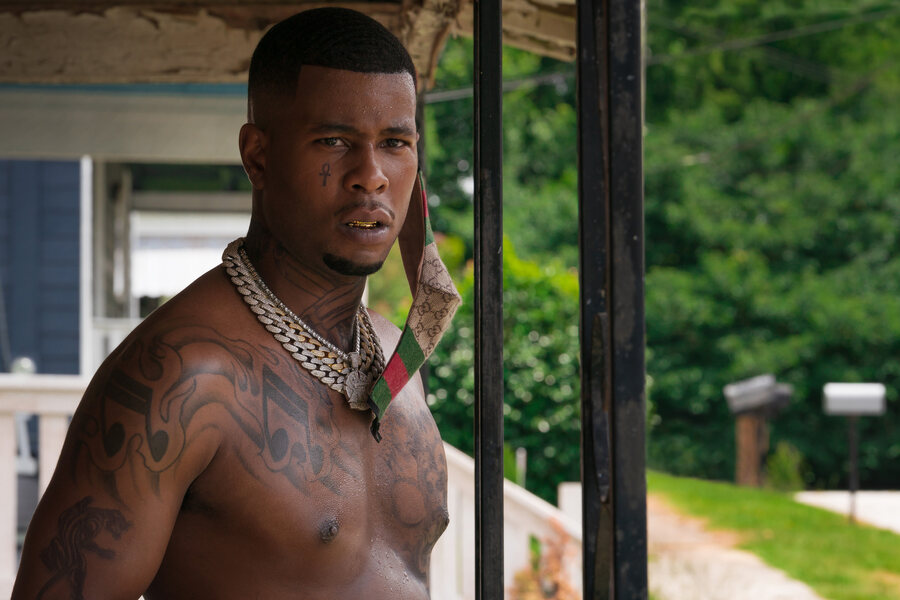
P-Valley series regular J. Alphonse Nicholson enrolled in North Carolina Central University’s (NCCU) theatre department in 2008 after then-Prof. Karen Dacons-Brock cast him in his first lead role because of his personality. The two-time NAACP Image Award nominee, who appeared on Broadway in the Leon-directed revival of A Soldier’s Play in 2020, credits NCCU’s late theatre department chair, Johnny Alston, for teaching him to balance his studies with his professional work, since he was already doing community theatre by his sophomore year.
“It was like having a grandfather or an uncle as your professor,” said Nicholson. “He had a very low tolerance for anything. He didn’t want you to be late. Your clothes had to look a certain way, and he didn’t want you coming in smelling a certain way. He cared about you and wanted you to do well, and even when you did wrong, he still loved you.”
Alabama State University alumnus Anthony M. Stockard is the founding artistic director of Norfolk State University (NSU) Theatre Company in Virginia, and founder of the HBCU’s drama and theatre degree program. Responsible for the school constructing a new state-of-the-art theatre in 2017 with full support from the school’s dean, Stockard takes pride in building partnerships among NSU, Equity actors, and theatre companies to help students learn how to put a price on their contributions to various stage productions.
“The students will eventually have agents and managers,” said Stockard, “but they have to start learning how to negotiate and set the bar for themselves, because once they get paid, it puts the monkey on their back, because now they’re being treated like professionals.
“I was taught to be in control of our own narratives, to make our own opportunities, know my worth and to teach people how to treat me,” Stockard continued. “The university can block whatever they want to at any time, but they gave me my wings and really supported me to make it happen. I was so used to asking for permission to do everything, but there was a confidence and trust that was there.”
That infectious energy from Black students is often reciprocated, motivating the faculty to bring their best selves to the department. Being in the company of hip, youthful energy, whether in class or during office hours, empowers the instructors to incorporate more up-to-date terminology and spirit into their lectures or face-to-face engagement.
“The students are very enthusiastic,” said Karen Turner Ward, artistic director of Hampton University Repertory Theatre in Virginia. “They keep you young and working. It keeps you wanting to influence them to have successful careers themselves. They know from the very first moment they step on campus that they’re going to be really supported and pushed to their limit to be creative.”
Learning Beyond the White Gaze
Advancing to conservatories and graduate theatre programs to pursue advanced degrees at predominantly white institutions (PWIs) can be a challenge for students coming out of HBCUs. The family-oriented atmosphere, intercultural diversity, and being the majority on the yard gives way to Black students typically being the first or one of few in the classes.
Auditioning for roles usually results in Black talent being pigeonholed, typecast, or not considered at all for full production seasons. “It’s Black privilege here at HBCUs, because everything is about them,” said Morgan State University’s theatre arts coordinator Janice Short. “Black students don’t have to wait for a role to come to them. The role that looks like or speaks to them is all created for them. We get to share stories from us, for us, by us with our community.”
By contrast, white professors’ lack of cultural awareness, classist attitudes, and tendency toward micro-aggressions at the conservatory level can make Black students uncomfortable, leading them to second-guess their abilities. Playwright and screenwriter Mansa Ra, formerly known as Jireh Breon Holder, studied theatre at both Morehouse College and at the all-male college’s all-women sister campus next door, Spelman College, before earning his MFA in playwriting from Yale School of Drama in 2016.
Describing the change of environment as “a hard culture shock,” Ra—who would go on to become a staff writer on the NBC medical drama New Amsterdam and have his play …what the end will be premiere at Roundabout Theatre—often clashed with the graduate faculty over his writing style and voice. It was the supportive and nurturing energy that he had experienced at the Atlanta University Center campuses that kept him encouraged enough to persevere, defend his creativity, and complete the Yale program, though he considered leaving.
“It was like night and day,” said Ra, who changed his name in late 2020. “I had to advocate for myself as a Black man in a way that I never had to do in school. It was new to me, standing in front of 60-year-old white men and women who had a very specific goal for my story, and to refuse what they wanted me to do.
“It’s the type of environment where you really have to have a degree of grit and personal fortitude to really survive, because Yale is the type of place that wants to break you down,” added Ra. “At HBCUs, the goal is always to build you up as high as you could go.”
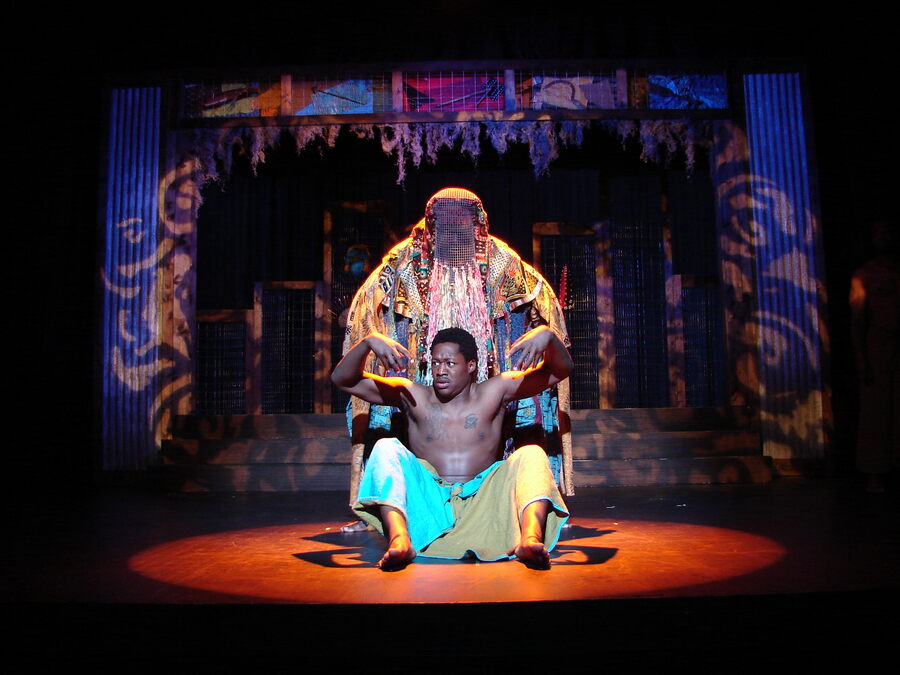
Grambling State University assistant professor of theatre Prince Duren spent 10 years teaching theatre at his alma mater, Jackson State University in Mississippi. He too experienced culture shock and felt inadequate as the only and first Black student to earn an MFA in playwriting and screenwriting from University of Arkansas in 2013. Duren, the recipient of the Lorraine Hansberry Award from the American College Theater Festival, struggled with imposter syndrome as he received white colleagues’ feedback and notes about both his writing and his racial identity.
“If they told me my name was wrong, I would’ve changed that, because at the time I didn’t know any better,” said Duren. “I didn’t feel like I belonged there, because the other people there had been practicing theatre for so long. There were several instances where I was overtly reminded that I was Black.” He remembers it all as a “nightmare.” What saved him, he said, is that he had still had people in his life “who believed in me and saw things in me that I very much didn’t see in myself.”
Recruiting high school students to consider HBCU theatre programs can be challenging for professors and staff, who sometimes experience anti-Blackness from teens at college fairs who may have been advised by guidance counselors that they won’t benefit from a Black college experience.
“Black students will intentionally divert themselves away from the booth or table because they are told that going to an HBCU is less than,” said Wells. “Some students will go other places and then find themselves at an HBCU, because they go to those other places and they’re not seen or have opportunities to get on the stage.”
Jones, on the other hand, believes her time at Clark Atlanta “gave her the tools to strengthen her Black voice.” She went on to train and catch numerous performances in London’s West End, crediting her professors’ constant encouragement to be her unapologetic self as the element that will help her land opportunities and future roles.
“I’m equipped to make theatre out of anything, whether it’s a black box with two chairs or fully immersive theatre with the top sets,” she said. “I can take nothing and make it whatever it is I need to tell a compelling story.”
Stockard’s intense preparation and ongoing conversations with his students past and present allows them to own the room, unlike what Black students typically face in predominantly white spaces. Christopher Lindsay, who went on to earn his MFA in Acting from Brown University’s Trinity Rep program in 2021 after finishing at NSU in 2017, originally shared the stage with his mentor in his first Equity acting job while he was in undergrad. The experience allowed him to perceive himself as just as talented as any professional or his grad school instructors onstage.
“A philosophy Prof. Stockard has imparted to his students is that regardless of what a space might be, predominantly white or otherwise, it is your job is to stay true to yourself and tell the best story possible,” Lindsay said. “It’s impossible to portray someone else authentically when you’re still discovering who you are.”
Reaching Back for the Next Generation
There’s a misconception at HBCUs that their theatre programs only read and produce plays written by the likes of Lorraine Hansberry, August Wilson, and Suzan-Lori Parks. HBCU professors beg to differ: They often reimagine Greek drama and works by Albee, Chekhov, Miller, and Wilder with a more modern perspective by setting the stories in Black neighborhoods, giving the characters more familiar names, or incorporating current events, pop culture references, and historic moments relevant to Black folks, so that their students can better relate to the subject matter and find the universal themes in the storytelling.
“HBCU programs allow us to discover who we are not only as human beings but as African Americans,” Wells said. “We do William Shakespeare, Tennessee Williams, Moliere, and Sophocles, but we approach those with an Afrocentric lens instead of a European lens.”
Tajleed Hardy, an NSU alumnus currently in the final year of his MFA program at University of Louisville, concurs. “HBCU theatre gives students a chance to find their identities as Black artists in the world,” he said. “It allows students to recognize their Blackness and make it their greatest strength when operating professionally.”
Nicholson shares Wells’ and Hardy’s sentiments.
“A lack of resources doesn’t mean we lack the knowledge,” he said. “The professors who are there are well-versed in their understanding, and I wouldn’t be the actor I am today without the HBCU theatre department. The care, love, and understanding are irreplaceable at an HBCU, and you won’t find that anywhere else.”
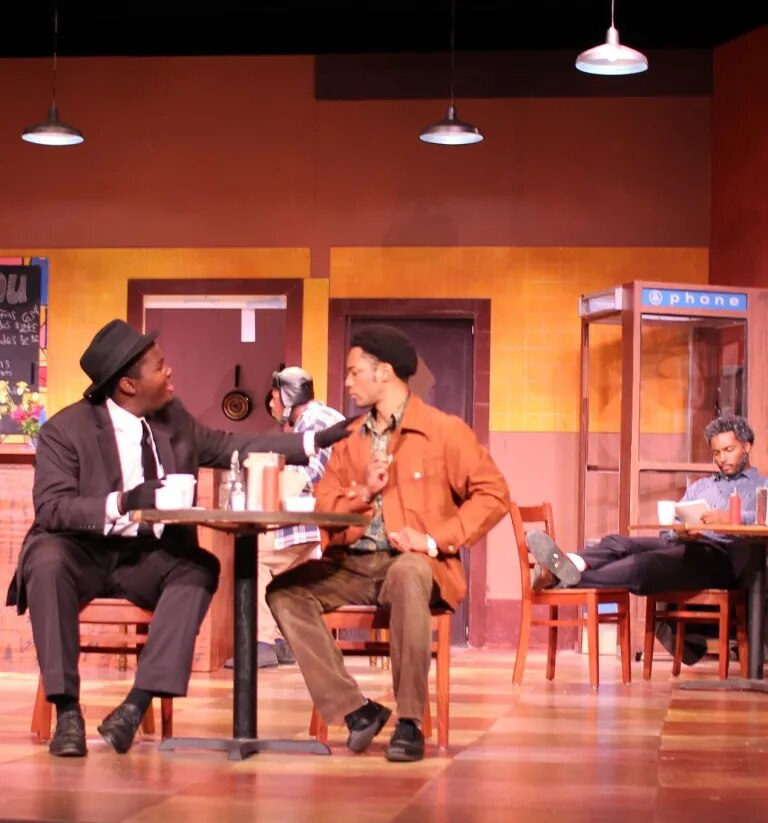
HBCU theatre programs also often encourage students to be productive citizens who reach back to uplift the younger generation once they become successful. Professors recommend their star pupils for gigs and various off-campus opportunities. In other cases, alumni will also reach back, whether through guest lectures in individual classes, shadowing, or apprenticeships. Not only does this create pipelines; it also helps current students have an idea of what’s possible for them.
“PWIs can’t tell our stories like we can tell them,” said Duren. “Yale, Harvard, Columbia, or NYU can do a Black play, but we have the Black and HBCU experience to bring these stories alive. It’s not just the cast or director; it’s the environment and the support that can never ever be duplicated.”
“The magic from our programs brings our students back,” added Short. “Graduates are going on to work at these theatres, and they reach back because they know that the students are being trained, and trained well.”
As such, HBCUs can provide the ideal incubator for change agents and game changers in the entertainment industry. They allow Black and brown students to dream big and strive for excellence in everything they pursue, especially, but not only, in theatre.
“You have to have a tenacious spirit, exceptional work ethic, respect for the work, and a heart filled with gratitude,” said Bonita J. Hamilton, an Alabama State University alumna who’s portrayed Shenzi in The Lion King on Broadway for the last 19 years.
“Students from HBCUs offer unfiltered, honest experiences from our culture, and half of Black Hollywood wouldn’t exist without it,” said Stockard. “It’s about realness, connection, bringing yourself to the stories, being bold about it, pushing yourself to your limits, and remembering who it’s for: representing your culture and all that comes with it.”
Christopher A. Daniel (he/him/his) is an award-winning journalist, cultural critic, ethnomusicologist, and college professor based in Atlanta. Follow Christopher on Twitter and Instagram @Journalistorian.

